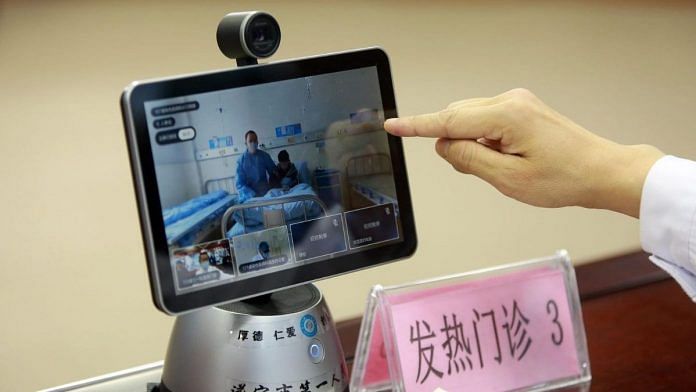The importance of sustainable solutions came to the fore in 2020 as communities across the world faced the threats of climate change and the COVID-19 pandemic.
Digital crowdsourcing platform UpLink was created to address such challenges and help speed up the delivery of the United Nations’ Sustainable Development Goals.
Unveiled at the World Economic Forum Annual Meeting in 2020, the platform connects the next generation of change-makers and social entrepreneurs to networks of contacts with the resources, expertise and experience to help bring about change.
Since its launch, UpLink has surfaced the best entrepreneurial solutions through competitions such as its Ocean Solutions Sprint, Trillion Trees Challenge, COVID-19 Social Justice Challenge and COVID Challenges. Here are some of the most innovative.
Ocean Solutions Sprint
UpLink: Ocean Solutions Sprint, with Kerstin Forsberg, @McCauley_Lab, @khailee, @msanjayan, Oliver Jan (@deloitte), @KRechberger, @shweyaminoo, Roger Larsen, Angeline Chen, Inés Yábar, and Olivier Michel (@UnseenLabs) https://t.co/nVvB2lsUsb
— World Economic Forum (@wef) June 1, 2020
Cubex Global
Oman-based Cubex Global aims to cut global shipping emissions by enabling businesses to easily buy and sell unused container space on existing cargo routes. The company claims that its blockchain-based marketplace could help reduce emissions from shipping vessels by up to 20% and recover about $25 billion in lost freight revenue each year.
RecyGlo
Waste management service RecyGlo works with businesses in Myanmar and Malaysia to recycle and process material in a safe and non-hazardous manner, helping to avoid mismanaged plastic being dumped in the region’s rivers and ending up in the ocean. The Yangon-based company manages 500 tonnes of waste and saves 1,470 tonnes of CO2 each month.
Oceanium
Scottish biotech start-up Oceanium uses sustainably-farmed seaweed to create food and nutrition products and compostable biopackaging. It believes that a sustainable seaweed farming industry can help mitigate the effects of climate change and create jobs.
COVID Challenge
The COVID Challenge, launched by the World Economic Forum’s UpLink platform, is a competition to source innovative solutions and responses to fight the coronavirus pandemic.
We've received 150 solutions so far, to vote for your favourite, visit UpLink:https://t.co/pf2Idtsvv7 pic.twitter.com/soRx3GziMx
— World Economic Forum (@wef) July 15, 2020
Intelehealth
Developed at Johns Hopkins University, Intelehealth is a telemedicine platform that connects patients and frontline health workers with remote doctors to deliver primary care services at a distance in countries such as India.
Also read: Not just for flu but even BP and gynaecology — how telemedicine is filling a Covid vacuum
Flare
Emergency services app Flare provides next-generation 911 for those who do not have access to help in case of an emergency. In Kenya, its ‘Uber for ambulances’ platform has reduced response times by 87% and helped save 2,500 lives since its 2017 launch.
Carbon Health
Tech-enabled primary care provider Carbon Health aims to improve access to world-class healthcare. In the US, it established pop-up COVID clinics in 30 cities, with doctors available on video call, and has so far tested more than 500,000 people.
Desolenator
Desolenator’s solar-powered water purification systems help remote communities produce clean drinking water, without the need for filters, chemicals or external energy sources. This helps them build water resilience in the face of climate change and the COVID-19 pandemic.
Trillion Trees Challenge
There used to be about 6 trillion trees on Earth. Now, half of them are gone.@1t_org and UpLink are launching the #TrillionTrees Challenge, a competition to find the ideas that will help us restore one trillion trees before 2030.
Find out more here: https://t.co/XEeC1HLsFZ pic.twitter.com/78nZ2mAYsk
— World Economic Forum (@wef) July 1, 2020
Borneo Nature Foundation
For over a decade, Borneo Nature Foundation has developed planting methods to reforest degraded deep peatland, which is an important carbon store, key to local economies and home to populations of orangutans. It has planted more than 30,000 seedlings, and established community seedling nurseries in villages near Borneo’s remaining tropical rainforests.
Reforestum and Ecosphere+
Spain-based CO2 offsetting service Reforestum teamed up with UK climate solutions company Ecosphere+ to enable individuals and businesses to finance forest conservation and restoration by offsetting their carbon footprint.
Inga Foundation
Slash-and-burn farming is the only source of income for millions of farmers but it’s devastating the world’s rainforests. This is something that the UK-based Inga Foundation wants to counter through its Inga Alley farming method, which helps farmers build long-term food security on one plot of land.
Social Justice Challenge
Do you have an idea to address social injustice and make the COVID-19 recovery more equal?
Visit UpLink to submit your solution before the Social Justice Challenge closes on Oct 11: https://t.co/s8laHkouLA pic.twitter.com/xhP62BoDoB
— World Economic Forum (@wef) October 6, 2020
citiesRISE
Global platform citiesRise seeks to transform mental health policy and practice for young people across the world through its Mental Health and Friendly Cities framework – something that is only likely to become even more relevant in the COVID-19 era.
TheraWee
Philippines-based telerehabilitation platform TheraWee aims to improve access to rehabilitation services for children with difficulties by connecting their parents with individuals, groups and communities that can offer them support.
Noora Health
US start-up Noora Health provides families with medical skills training to help look after their loved ones, both in health facilities and at home. Its Care Companion Program has already reached more than 1 million relatives in India and Bangladesh.
Family Mask’s #PPEforAll
Global Citizen Capital and its company Family Mask’s #PPEforAll initiative was set up to boost access to affordable personal protective equipment (PPE) as the pandemic hit. By July 2020, more than 1 million masks had been distributed to elderly people across the world.
Natalie Marchant, Writer, Formative Content
This article was previously published in the World Economic Forum.
Also read: Why telemedicine could remain popular across Asia even after Covid is controlled
